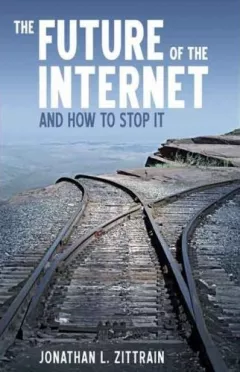
The Future of the Internet - And How to Stop It
Jonathan Zittrain (Special Videocast)
Berkman Center co-founder Jonathan Zittrain gave a special inaugural lecture on Tuesday, April 25 at Oxford University. Prof. Zittrain, who served as Berkman's first executive director from 1997-2000, is currently Chair in Internet Governance and Regulation at Oxford University, and the Jack N. and Lillian R. Berkman Visiting Professor for Entrepreneurial Legal Studies at Harvard Law School. His research includes digital property, privacy, and speech, and the role played by private "middlepeople" in Internet architecture.
Prof. Zittrain's lecture, titled "The Future of the Internet -- And How to Stop It," proposes a theory about what lies around the corner for the internet, how to avoid it, and how to study and affect the future of the internet using the distributed power of the network itself, using privacy as a signal example.
Visit the Oxford Internet Institute's archive. Prof. John Palfrey of the Berkman Center and Harvard Law attended and took notes from the lecture.
Lecture notes provided by Prof. John Palfrey:
(Quotable bit from JZ: “I have a nerd-like joy in what the Internet brings.”)
JZ frames his lecture with a conception of the public and the private -- a familiar theme in legal scholarship. The idea is that some controls, some forms of governance, are exercised by the state (in the familiar form, a law passed by a legislature) and others by private firms (a company's privacy policy, for instance). JZ introduces new spins on this classic theme.
He traces through the classic view of privacy as defense to privacy as strategy -- vesting your identity in new places (your iPod, YouTube), expressing that identity in new ways (in virtual worlds, mmogs).
By way of examples of successes of this new expansive medium, and the expansion of the private into “the new public,” he's focused mostly on widely distributed solutions to complex online problems. Wikipedia, he notes, is a huge deal. As is the “sorry” project through which Americans apologized to the rest of the world. These online movements are more than “just the trinket of the moment.”
And what can go wrong? So, anyone can edit any entry, right? What happens when the new public (private) goes up against the government?
The prospect for government surveillance of our distributed online selves is plainly greater, JZ frets.
Or new kinds of control exercised by the new public -- like Tor or Google or MSN Spaces -- which have punishment mechanisms built in to their decision-making processes. Or more remarkably, the global distributed set of dashboards of the health of your PC and of the Internet at large (think of what it could tell us about filtering, about viruses and spywarean about spam). Think of Paul Vixie's black-list approach to fighting spam, but yet more distributed, with less reliance on a single man -- but no more state involved in regulation with collective power rivalling the public power.
The problem with this: what about when the crowds are not so wise? Or even flat out wrong?
What is your recourse? How can you get due process from the crowds? That's his hard problem.
(Another side note to slip in is that the sun came out, just in time for the lecture.)
We are going to be more and more putting aspects of our identity into digital space. Just as we have price discrimination based on fine-grained digital information, we might also have reputation-based collaborative filtering mechanisms -- witness Cyworld. We will be testing, JZ says, the core IETF principles that people are reasonable and that people are nice. Wikipedia appeals to this positive side of people.
Instead of thinking about ICANN or the ITU or the WGIG, JZ wonders about:
What are the digital environments that inspire people to act humanely? Promote small, light-weight communities like the Wikipedia communities built up around entries like the Rachel Corrie page. (My favorite is the Alexander Hamilton community.)
What are we using the Internet for in universities? Nothing good, yet. Why did Fathom fail? For the same reason that Wikipedia is cleaning Encarta's clock. We have the chance to build communities around ideas - to expand the knowledge base, to broaden the conversation. Our challenge, JZ says, is to make sure that we are building monuments of humanity on the Internet.
Bravo, JZ -- a tour de force.


